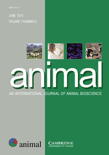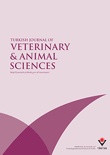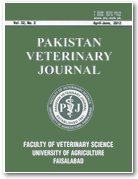
REVISTA CIENTIFICA-FACULTAD DE CIENCIAS VETERINARIAS
Scope & Guideline
Unlocking insights for a sustainable future in veterinary science.
Introduction
Aims and Scopes
- Animal Health and Disease Management:
Research on the diagnosis, treatment, and prevention of diseases in various animal species, including studies on zoonotic diseases and their implications for public health. - Veterinary Pharmacology and Toxicology:
Investigations into the effects of drugs and chemicals on animal health, including studies on toxicology, pharmacokinetics, and the development of therapeutic protocols. - Reproductive Biology and Veterinary Obstetrics:
Studies focused on reproductive performance, fertility management, and obstetric techniques in livestock and companion animals, contributing to improved breeding practices. - Nutrition and Feed Efficiency:
Research on the nutritional requirements of different animal species, feed formulation, and the impact of diet on health and productivity, emphasizing sustainable practices. - Animal Welfare and Behavior:
Exploration of animal welfare issues, behavioral studies, and the impact of environmental factors on the well-being of domestic and wild species. - Genetics and Biotechnology in Animal Production:
Utilization of genetic and biotechnological approaches to enhance livestock production, disease resistance, and overall animal health. - Epidemiology and Public Health:
Studies assessing the epidemiology of animal diseases and their relationship with human health, including surveillance and control measures. - Aquatic Veterinary Medicine:
Research addressing health issues in aquatic species, including fish and shellfish, with implications for aquaculture and environmental health.
Trending and Emerging
- Sustainable Animal Production:
There is a growing emphasis on sustainable practices in animal agriculture, including the use of alternative feed sources and environmentally friendly production methods, reflecting global concerns about food security and environmental impact. - Zoonotic Disease Research:
Increased focus on zoonotic diseases highlights the importance of understanding the transmission of diseases from animals to humans, especially in the context of global health crises like the COVID-19 pandemic. - Nutritional Genomics:
Emerging studies on the genetic aspects of animal nutrition are gaining prominence, exploring how genetic variations influence dietary needs and responses, thus enhancing animal health and productivity. - Biotechnology and Genetic Engineering:
Advancements in biotechnology, including CRISPR and other genetic engineering techniques, are becoming increasingly relevant in veterinary research, particularly for disease resistance and productivity improvements. - Holistic Approaches to Animal Welfare:
A trend towards more holistic approaches to animal welfare is evident, integrating behavioral science, environmental enrichment, and health management strategies to promote overall well-being. - Integrative One Health Approaches:
Research that combines human, animal, and environmental health perspectives is on the rise, reflecting a comprehensive understanding of health issues and their interconnectedness. - Veterinary Public Health Initiatives:
Emerging themes in veterinary public health focus on surveillance, prevention, and control measures for animal diseases that impact human health, emphasizing the role of veterinarians in public health.
Declining or Waning
- Traditional Veterinary Practices:
Research related to conventional veterinary practices and treatments has seen a decline as the field moves towards more innovative and evidence-based approaches. - Overreliance on Antibiotics:
There has been a noticeable decrease in studies promoting antibiotic use, likely due to increasing awareness of antimicrobial resistance and the shift towards alternative therapies. - Generalized Animal Husbandry Practices:
Topics focused solely on traditional animal husbandry without integrating modern techniques or sustainability have become less prominent, as the field evolves towards more comprehensive and sustainable practices. - Clinical Case Reports:
While clinical case reports remain valuable, there has been a waning interest in publishing such reports in favor of more data-driven research and experimental studies. - Non-Integrated Approaches to Veterinary Science:
Research that does not encompass interdisciplinary or integrated approaches is becoming less common, as the field increasingly recognizes the need for comprehensive solutions to animal health challenges.
Similar Journals

Acta Scientiae Veterinariae
Championing free access to vital veterinary research.Acta Scientiae Veterinariae is an esteemed academic journal dedicated to advancing knowledge in the field of veterinary sciences. Published by the Universidade Federal do Rio Grande do Sul, this journal serves as a vital platform for researchers, professionals, and students interested in the latest findings and developments in veterinary medicine and related disciplines. Operating under an open access model, Acta Scientiae Veterinariae ensures that its content is freely accessible, promoting widespread dissemination of research that contributes to the understanding and welfare of animal health. With an ISSN of 1678-0345 and an E-ISSN of 1679-9216, the journal has made a significant impact in its category, holding a Q4 ranking in the Veterinary (miscellaneous) category as per the latest 2023 categorizations and ranking in the 11th percentile, reflecting its continued relevance within the academic community. As it converges years from 2010 to 2024, Acta Scientiae Veterinariae continues to foster innovation and collaboration in veterinary research, making it an invaluable resource for those committed to enhancing animal health and veterinary practices.

Revista Colombiana de Ciencias Pecuarias
Empowering Research for a Sustainable Future in Animal HusbandryRevista Colombiana de Ciencias Pecuarias, an esteemed publication in the field of Animal Science and Veterinary Studies, is published by the Universidad de Antioquia, Faculty of Agricultural Sciences. Since its inception in 1996, this Open Access journal has become a vital resource for the dissemination of research and advancements within the agricultural and biological sciences, specifically targeting the veterinary and animal husbandry sectors. Situated in Colombia, its mission is to support and promote scientific knowledge through rigorous review processes and high-quality articles. The journal’s recent classification includes Q4 in Animal Science and Zoology and Q3 in Veterinary categories, illustrating its commitment to enhancing its scientific impact. As it converges from 2008 to 2024, this journal aims to engage researchers, professionals, and students alike, establishing a collaborative environment for innovative research and findings that shape the future of animal sciences globally.

Frontiers in Veterinary Science
Leading the way in veterinary research and innovation.Frontiers in Veterinary Science is a premier open-access journal dedicated to the latest advancements and research in the field of veterinary science. Published by FRONTIERS MEDIA SA in Switzerland, the journal has been at the forefront of disseminating high-quality research since its establishment in 2014. With an impressive rank of #15 out of 194 in the general veterinary category and a high percentile of 92nd in Scopus rankings, it is recognized as a leading publication in veterinary medicine and related disciplines, maintaining a prominent Q1 quartile status as of 2023. The journal promotes the wide dissemination of knowledge through its open-access policy, ensuring that researchers, professionals, and students have unrestricted access to critical findings and innovations in veterinary science. Nestled in the vibrant academic landscape of Lausanne, Switzerland, Frontiers in Veterinary Science is not just a journal; it is a vital resource for advancing veterinary practices and improving animal health globally.

Tropical Animal Science Journal
Championing Open Access for Global Impact in Animal ScienceTropical Animal Science Journal, ISSN 2615-787X, E-ISSN 2615-790X, is an esteemed open-access journal published by the Bogor Agricultural University, Faculty of Animal Science. Launched in 2018, this journal serves as a pivotal platform for disseminating high-quality research in the fields of Animal Science, Food Animals, and Veterinary Medicine. With its significant presence in Indonesia and a commitment to scientific innovation, it has achieved a Q3 ranking in Animal Science and Zoology and Food Animals, as well as a Q2 ranking in Veterinary (miscellaneous) as of 2023. The journal also enjoys favorable Scopus rankings, placing it in the 61st percentile for General Veterinary and demonstrating its relevance and impact in the academic community. As an advocate for open-access publishing since its inception, the journal enhances accessibility to critical research findings, making it an invaluable resource for researchers, professionals, and students alike who aim to advance their knowledge and contribute to the fields of tropical animal science.

BMC Veterinary Research
Championing open access for veterinary excellence.BMC Veterinary Research, published by BMC in the United Kingdom, stands as a pivotal open-access platform dedicated to advancing the field of veterinary science since its inception in 2005. With an impressive impact factor that reflects its influential presence, this journal has achieved a remarkable ranking of #17 out of 194 in the Scopus Veterinary category, placing it in the 91st percentile among its peers. The journal serves as an essential resource for researchers, professionals, and students alike, fostering the dissemination of high-quality research and innovative practices within the veterinary and broader medical communities. With its commitment to open access, BMC Veterinary Research ensures that valuable insights are accessible to all, promoting collaboration and knowledge sharing that drive the advancement of veterinary sciences. As it continues to publish significant findings until 2024, it remains a key contributor to the contemporary discourse on animal health and welfare.

Animal
Fostering interdisciplinary dialogue in animal research.Animal is a leading academic journal published by Elsevier that stands at the forefront of research in the field of Animal Science and Zoology. Founded in 2007, it has rapidly garnered a prestigious reputation, achieving a remarkable Q1 ranking in its category for the year 2023, placing it in the top 4% of journals in the discipline. With an impressive impact, as indicated by its rank of 19 out of 490 in Agricultural and Biological Sciences on Scopus, this journal serves as a vital platform for researchers, professionals, and students to disseminate groundbreaking findings and interdisciplinary studies. Animal not only offers paid subscription access but also provides an option for Open Access, thereby enhancing the visibility and reach of significant research contributions. With its comprehensive scope and commitment to advancing the understanding of animal biology, behavior, and welfare, Animal plays a crucial role in shaping the future of animal science. For anyone invested in the environment, veterinary medicine, or wildlife management, this journal is an essential resource that fosters knowledge exchange and continued developments in the field.

TURKISH JOURNAL OF VETERINARY & ANIMAL SCIENCES
Championing Open Access for Global Veterinary Insights.TURKISH JOURNAL OF VETERINARY & ANIMAL SCIENCES is a distinguished peer-reviewed journal dedicated to advancing knowledge in the field of veterinary sciences and animal health. Published by the Tubitak Scientific & Technological Research Council Turkey, this journal provides a platform for high-quality research, fostering scientific inquiry that spans various aspects of veterinary medicine, animal biology, and animal husbandry. With an impact factor that reflects its growing influence within the Q3 category of Veterinary (miscellaneous) according to the 2023 rankings, it is strategically positioned in the academic landscape, ranked #112 out of 194 in the broader veterinary field. The journal is committed to open access publications, ensuring that research is accessible to a global audience, facilitating collaboration and knowledge sharing among researchers, professionals, and students. By covering a broad spectrum of topics from clinical research to veterinary policy, the TURKISH JOURNAL OF VETERINARY & ANIMAL SCIENCES plays a crucial role in enhancing the understanding and welfare of animal species, thereby contributing significantly to both scientific advancement and practical applications in veterinary practice.

PAKISTAN VETERINARY JOURNAL
Fostering collaboration for a sustainable veterinary community.Pakistan Veterinary Journal (ISSN: 0253-8318, E-ISSN: 2074-7764) is a leading peer-reviewed academic journal published by the University of Agriculture, Faculty of Veterinary Science, situated in Faisalabad, Pakistan. Since its inception, the journal has embraced an Open Access policy, facilitating the dissemination of vital research findings to a global audience and enhancing the visibility of veterinary science. With an impressive Q1 ranking in the veterinary miscellaneous category, the journal ranks #27 out of 194 in the veterinary general field according to Scopus, placing it in the top 14% of the discipline. The scope of the journal encompasses a wide array of topics relevant to veterinary medicine, ensuring that it serves as an essential resource for researchers, professionals, and students alike. By providing a platform for high-quality research from 2009 to 2024, the Pakistan Veterinary Journal continues to play a pivotal role in advancing veterinary science, promoting collaboration among scholars, and addressing contemporary challenges in animal health and welfare.

Slovenian Veterinary Research
Enhancing Accessibility to Cutting-Edge Veterinary StudiesSlovenian Veterinary Research, published by the University of Ljubljana, serves as a significant platform for the dissemination of research within the veterinary field. With an ISSN of 1580-4003 and an E-ISSN of 2385-8761, this open-access journal has made its content freely available to the global research community since 2021, enhancing accessibility and engagement. The journal's scope includes a diverse range of topics relevant to veterinary science, aiming to foster innovation and collaboration among researchers, professionals, and students in the field. Although currently categorized in the Q4 quartile for veterinary studies, the journal is committed to improving its impact and visibility, particularly as it converges on its upcoming years of operation from 2007 to 2024. As it strives to elevate its Scopus ranks, currently positioned at rank #162/194 in General Veterinary, Slovenian Veterinary Research provides a vital resource for advancing knowledge and best practices in veterinary medicine. For anyone interested in the latest veterinary research trends and findings emanating from Slovenia and beyond, this journal represents an essential source of information.

Thai Journal of Veterinary Medicine
Advancing veterinary science for a healthier tomorrow.Thai Journal of Veterinary Medicine, published by Chulalongkorn University, serves as a vital resource for researchers, practitioners, and students in the field of veterinary science. With an ISSN of 0125-6491, the journal has been providing a platform for the dissemination of original research and reviews since its inception, with a focus on advancing veterinary practice and animal health in Thailand and the broader Southeast Asian region. The journal is recognized in the Scopus database, currently ranked in the Q4 category for Veterinary (miscellaneous), reflecting its commitment to quality despite being in a highly competitive space. The scope of the journal encompasses a wide array of topics pertinent to veterinary medicine, ensuring accessibility to diverse veterinary disciplines. While the journal currently does not offer an open-access option, it remains dedicated to contributing valuable knowledge and insights to the veterinary community, supporting the improvement of animal welfare and public health initiatives in the region. As it continues to publish until 2024, the Thai Journal of Veterinary Medicine invites contributions that align with its objectives of fostering scholarly discourse and advancing veterinary research.